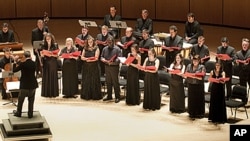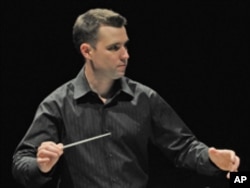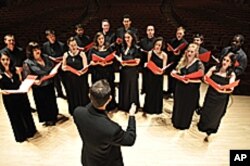In August, a new recording of Italian composer Claudio Monteverdi's 1610 masterpiece, "The Vespers of the Blessed Virgin," was released on iTunes, the popular online music platform. It promptly landed in the ranks of the top ten classical recordings, sandwiched between the London Symphony Orchestra and cellist Yo-Yo Ma.
What makes this unusual is that the recording is by a little known Miami-based professional choir called Seraphic Fire - and they released it themselves.
'Vocally brilliant'
Seraphic Fire made its debut a little over seven years ago. Classical music critic Greg Stepanich says it's become an essential part of South Florida's music scene - performing works from the Renaissance to the 21st Century.
"Every concert that they do is not just...'Well, we're gonna put some stuff on here that people will like,' say Stepanich. "It's all thought out, intellectually. And then when you go hear it, it's vocally brilliant."
The group's founder and conductor is Patrick Quigley. Under his leadership, Seraphic Fire has sung with the New World Symphony and a well-known pop star.
"We recorded with Shakira, on her album, "Oral Fixation 2," says Quigley, "and recorded a sort of Gregorian chant-esque track to open that disk."
Big project
A couple of years ago, Seraphic Fire received a $25,000 grant and decided to tackle a big project: recording Claudio Monteverdi's Vespers of 1610, one of the greatest choral works of all time.
They teamed up with the Western Michigan University Chorale and recorded it in a little stone chapel in Kalamazoo.
According to Quigley, the famous piece has a kind of utilitarian history. Around 1608, the middle-aged Monteverdi was unhappy in his position with the Gonzaga family at the court in Mantua. So, over the course of the next two years, he compiled a large book of compositions, which included the Vespers, and dedicated it to the Pope.
"The Vespers is, in essence, a job application," says Quigley. "Or at least the lore tells us."
And it worked.
"Eventually, the position at St. Mark's in Venice came open - the basilica there - and he assumed the directorship there. And the rest is history."
Quigley says the piece is often performed in a grand manner - with brass and strings.
"Most of the recordings and most of the performances that one hears of this piece tend to be a large Baroque/Renaissance/in-the-middle-there orchestral accompaniment with double choir and soloists."
Exercising options
But, in the score, Monteverdi suggests it can be done in a smaller way.
"When we take a step back and look at the words that Monteverdi himself wrote in the print, we see that the word optional is used a whole heck of a lot," says Quigley.
So, instead of a large orchestra, Quigley chose to use only three instrumentalists. The gathered forces spent a week together, rehearsing and recording the Vespers.
When it was finished, Quigley shopped the recording to several record labels. Even though the industry professionals liked it, they all turned him down, telling Quigley they couldn't afford to take a gamble on someone that they knew nothing about.
So Seraphic Fire released the CD themselves and placed it on iTunes. When it came out in mid-August, it was a featured selection. Quigley took a screen shot, put it on his Facebook page and tagged everyone who was on the recording.
Going viral
"And everyone started to share this with all of their friends on Facebook and saying, 'Look, you know, we got featured on iTunes,' says Quigley. "Well, by the end of the day, someone noticed that we had moved into the 18th best-selling classical album on iTunes."
Within 36 hours, it was number six. For Quigley, the viral explosion of interest in the piece has been gratifying for many reasons, most especially because so many of the people who downloaded it were unfamiliar with Claudio Monteverdi.
"Introducing a younger audience to this 400-year-old music, I mean, it was one of those fantastic things that happens only through the Internet."






